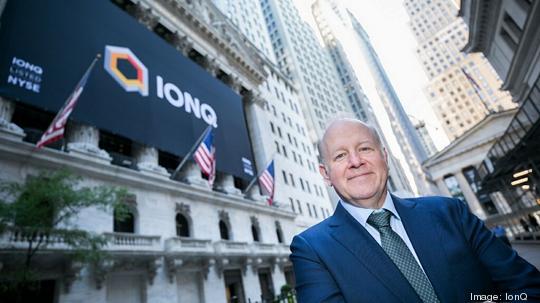
College Park quantum computing company IonQ Inc. (NYSE: IONQ) has acquired a Toronto software startup in a deal its CEO says will accelerate its growth by allowing quantum computers to better communicate with one another.
The deal for Entangled Networks Ltd., announced Wednesday, is the first ever for IonQ, which was founded by a couple of university professors in 2015 and went public in 2021 via a merger with a special purpose acquisition company.
IonQ ionizes atoms of a rare Earth element, ytterbium, as a method to entangle or superposition those particles to potentially gain significantly more computing power from them. The acquisition of Entangled Networks provides IonQ with the software solution to connect quantum computers and create supercomputers, said President and CEO Peter Chapman.
“This particular acquisition is about how we scale quantum computing," said Chapman, who declined to disclose terms of the deal. "At some point no matter what the technology, you just can't put more qubits onto a chip. And so then you have to network them together the same way you do" with traditional computers.
The deal also gives the company a foothold in Canada as it seeks to expand its global footprint. IonQ expanded into Germany and Israel last summer
IonQ provides and maintains quantum computers for such companies as Microsoft Corp. (NASDAQ: MSFT), Airbus and General Electric Corp. (NYSE: GE). It also recently secured a $13.4 million contract to provide its quantum computing hardware to the U.S. Air Force Research Laboratory.
In the third quarter, IonQ reported $2.8 million in revenue and $16.4 million in bookings. It projected a fourth quarter revenue between $2.9 million and $3.4 million and for the full year, it expects revenue to fall between $10.2 million to $10.7 million.
The company has yet to turn a profit, though, as it continues to invest heavily in research and development and talent. Through the first nine months of 2022 it lost $29.9 million, compared to losses of $32.1 million in the first three quarters of 2021. Its shares were trading at $4.19 midday Friday, up 3.3% from Thursday's closing price.
The deal for the two-year-old Entangled would add about a dozen employees to IonQ's ranks of more than 200. Chapman said he plans to continue to hiring aggressively despite fears from economists that the country could soon fall into a recession.
"We're in the middle of a massive hiring spree, which is powered by the progress we're making in the business," he said. "We're also in a race for who's going to win quantum, so those kind of trump the current economic conditions."
Chapman takes it as a point of pride that IonQ was the the first company out of the University of Maryland’s Discovery District to go public. The value of remaining headquartered there, he said, is the access to human capital, as Prince George's County has the largest concentrations of quantum engineers and computer scientists in the country.
Chapman compared today's quantum computer to microchips in the 1970s, when even the brightest minds at the likes of Intel Corp. could not have imagined they'd be used for anything other than a calculator.
"Of course, they were 100% wrong. Luckily for them,” Chapman said. “I think we're a little bit in that kind of same place today, where we probably lack imagination as to what it is you're going to do with these machines in the future.”
Still, he said corporations' and governments' desire to use quantum computing is on the rise and that it's only a matter if time before the technology is in everyday consumer products.
“You'll start to see enterprises, who have very large computational problems start to move their workloads to quantum computers, and that will accelerate over the next couple of years," he said. It’s "probably 15 or 20 years before it goes into a consumer product [so] it might be your kids that are wearing a quantum iWatch."
